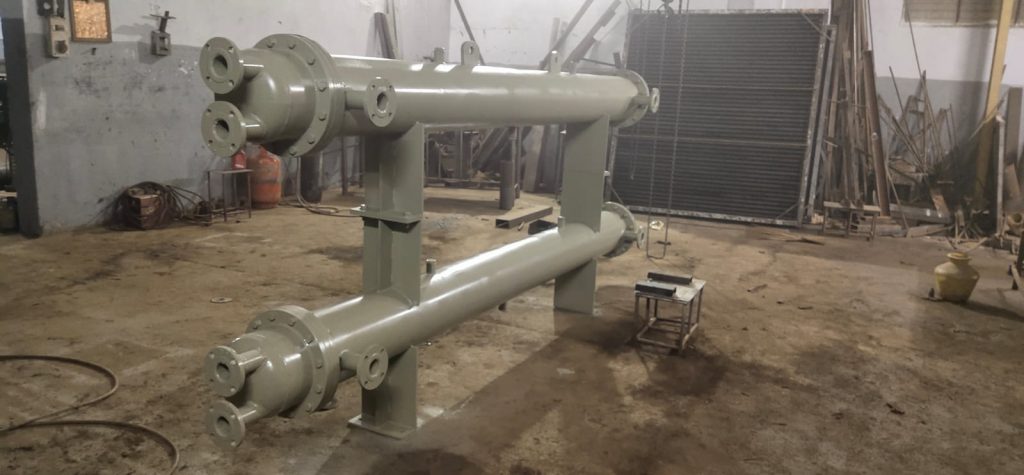Application of Lube oil cooler
e key applications of lube oil coolers, categorized by industry and system.
1. Automotive Applications
This is the most common application most people encounter.
- Internal Combustion Engines:
- Function: Engine oil absorbs immense heat from combustion, friction in the piston rings, bearings, and camshafts. The cooler maintains optimal oil viscosity (thickness), preventing thermal breakdown.
- Vehicles: Found in almost all modern cars, trucks, diesel engines, and motorcycles. High-performance and turbocharged engines almost always have dedicated, high-capacity oil coolers.
- Automatic Transmissions:
- Function: Transmission fluid is a lubricant. It gets extremely hot due to friction in the torque converter, clutch packs, and planetary gears. An external or integrated transmission oil cooler is crucial to prevent burning the fluid, which leads to shifting problems and transmission failure.
- Vehicles: Standard in most automatic transmission vehicles. Essential for towing, hauling, or performance driving.
- Differentials and Transfer Cases:
- Function: In high-stress applications (e.g., off-road vehicles, heavy-duty trucks, sports cars), the gear oil in differentials can overheat. Coolers are used to maintain performance and longevity.
2. Marine Applications
- Main Propulsion Engines:
- Function: Massive marine diesel engines run for extended periods under heavy load. Lube oil coolers are absolutely critical to prevent engine seizure and ensure reliability during long voyages. They are typically shell and tube type coolers using seawater as the coolant.
- Marine Gearboxes & Stern Tubes:
- Function: The gearboxes that transfer power from the engine to the propeller shaft, as well as the stern tube bearings, require constant lubrication and cooling.
3. Industrial & Manufacturing Applications
This is where lube oil coolers are found in their most varied and heavy-duty forms.
- Gas Turbines:
- Function: The bearings supporting the extremely high-speed rotor in power generation turbines (for electricity or mechanical drive) require a constant flow of cooled oil to prevent catastrophic failure.
- Compressors:
- Function: Large air compressors (reciprocating and rotary screw) and gas compressors (used in refrigeration and petrochemical plants) generate significant heat from compression and mechanical friction. Cool oil is essential for sealing, lubrication, and preventing dangerous temperature rises.
- Hydraulic Systems:
- Function: Hydraulic oil heats up as it is pressurized by pumps and forced through valves and actuators. Overheated hydraulic oil loses its ability to lubricate and can damage seals and components. Coolers are standard on large industrial machinery like injection molders, presses, and excavators.
- Gearboxes:
- Function: Large industrial gearboxes, such as those in wind turbines, mining equipment, steel rolling mills, and conveyor systems, generate immense heat from gear meshing. Oil coolers are mandatory to protect the gears and bearings from wear and pitting.
- Electric Generators:
- Function: Large generator bearings often require oil lubrication systems with coolers to maintain stable temperatures during continuous operation.
4. Power Generation
- Function: Beyond gas turbines, lube oil coolers are critical for bearings in steam turbines, hydroelectric turbines, and the large fans used in cooling towers at power plants. They ensure uninterrupted operation of the equipment generating our electricity.
5. Aviation & Aerospace
- Piston Engines:
- Function: Similar to automotive engines, but reliability is paramount. Often use air-cooled oil coolers mounted on the engine cowling to manage heat.
- Jet Engines:
- Function: Jet engines have a complex lubrication system for their main shaft bearings and accessory gearbox. These systems use highly sophisticated heat exchangers to cool the oil in an extreme temperature environment.
6. Racing & High-Performance Sports
- Function: This is a extreme application of automotive principles. Race cars (F1, NASCAR, Le Mans), dragsters, and high-performance motorcycles operate their engines and transmissions at the absolute limit. Massive, efficient oil coolers are non-negotiable for managing extreme heat and ensuring the engine survives the race.
